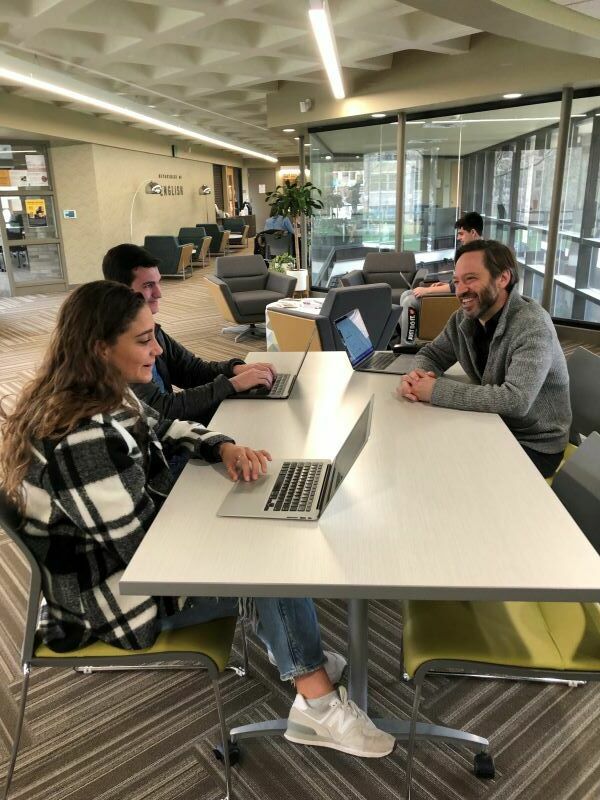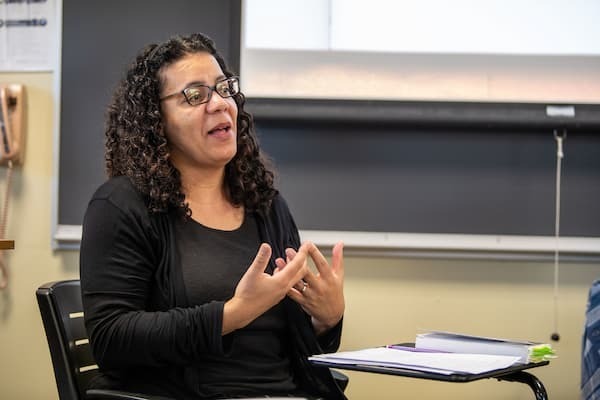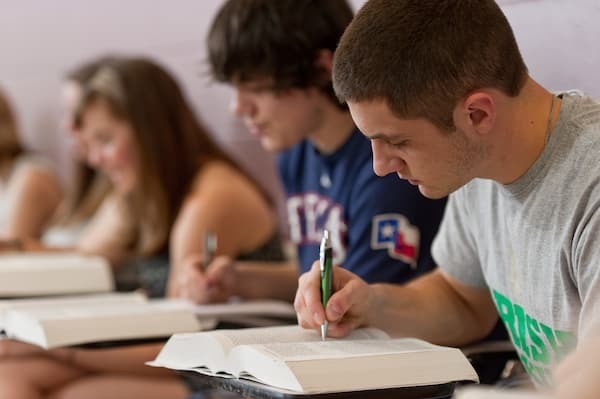About
What we do

In English we study and create works of imaginative literature: stories we tell each other about who we are, linguistic forms that pattern our thoughts in ways both familiar and strange. Since literary cultures are one record humans make of their attempts to live together, we read poems and novels both to investigate the past and to explore critically how our present is constructed through power, class, race, and gender.
But more than mere historical evidence, literary works are also tools and resources for thinking beyond the bounds of “the best which has been thought and said.” To read and write is to open up unseen possibilities for changing the present and creating better futures.
Students of English learn how to interpret their lives, respond critically to the world, and compel audiences. Our students also learn that literature itself—from the work of William Shakespeare to Jane Austen, James Baldwin, and Sally Rooney, to our own imaginative creations—is a vital laboratory for personal and collective transformation.
Who we are
Our scholars study everything from Old Norse to Afro-Caribbean poetry, from Renaissance drama to the intersections between Irish and African-American culture, from 18th-century drinking songs, to Victorian novels, to the politics of video games. We offer training across literary historical periods, and in such modes as translation, religion and literature, literature and film, and book history.
Our creative writing faculty’s work explores the necropastoral, migration, exile, gender, race, geopolitical conflict, and the scars and storms of a changing planet. Their aesthetic approaches range from the speculative and the surreal to formalism and social realism. With strengths in literary translation and international literature, they strive to redefine the boundaries of what literature might do. Our creative writing faculty help shape the vibrant literary scene at Notre Dame not only through their work, but through the press Action Books, the literary journal Notre Dame Review, and the undergraduate creative writing journal Re:Visions.

The English Department faculty consistently win accolades and fellowships from organizations including the Guggenheim Foundation, the U.S. Fulbright Program, the National Academy of Education, the National Humanities Center, the American Council of Learned Societies, the Lannan Foundation, the Sewanee Writers Conference, and the Pen/Faulkner Foundation. Our faculty play major editorial roles in influential academic book series and journals from Studies in the Age of Chaucer to Post-45. They oversee the publication of respected scholarly literary editions. English department faculty edit the journal Religion and Literature, based here at Notre Dame. Their commitment to excellence and innovation in teaching is routinely recognized within the university.
English faculty are crucial to interdisciplinary collaboration at the University of Notre Dame through their administrative and collaborative roles in programs across campus. We have interdisciplinary partnerships with many centers, institutes, and programs across campus and the broader Michiana community. Our faculty were among the founding partners of the Moreau College Initiative at Westville Correctional Facility.
What our students learn
Our English majors are sharp, critical, and flexible thinkers who have learned how to shift perspectives, move from part to whole and back again, take in context, and consider the audience. They go on to become account executives, marketing coordinators, teachers, journalists, lawyers, writers, and consultants. Because so many of our majors are double majors, they also go on to work in science, medicine, politics, and finance. What sets them apart is their deep grounding in the study of literatures in English, their polished writing and communication skills, their sophisticated appreciation of language, and their attention to detail. Their English degree gives them the skills, insight, and knowledge to translate their ideas into compelling narrative.

Our undergraduate bachelor’s degree in English is a rigorous, ten-course sequence that offers both a thorough grounding in the discipline and the flexibility to pursue an individual path. We also offer a Creative Writing Concentration; a competitive Honors Concentration, which includes writing a research thesis; and a Creative Writing Honors Concentration, which includes a creative thesis.
Whichever of these options our students choose, many enhance their learning through study abroad in a variety of locations, including at our Global Gateways in London and Dublin, and our summer creative writing seminar at Notre Dame's Kylemore Abbey facility in Galway, Ireland.
In addition, we feature a highly ranked MFA program in creative writing, a selective and rigorous Ph.D. in English, an M.A./J.D. program in collaboration with the Notre Dame Law School, and a Master's Program for Notre Dame and St. Mary's College undergraduate English majors seeking advanced training and for students with portable scholarship funding from foundations and governments.
Equity and inclusion
The Department of English is committed to affirming the human dignity of all. The members of this department support and actively work to ensure the inclusion of our faculty, staff, and students regardless of gender, race, religion, or sexual orientation. We stand in solidarity with communities of color and indigenous people, as well as movements against racism, colonization, and violence worldwide.
Support us
The Department of English welcomes your support in any number of ways. We value the time, talent, and treasure of our graduates and friends and welcome collaborative efforts to further our work. Make a gift here or connect with the department about other ways to get involved.